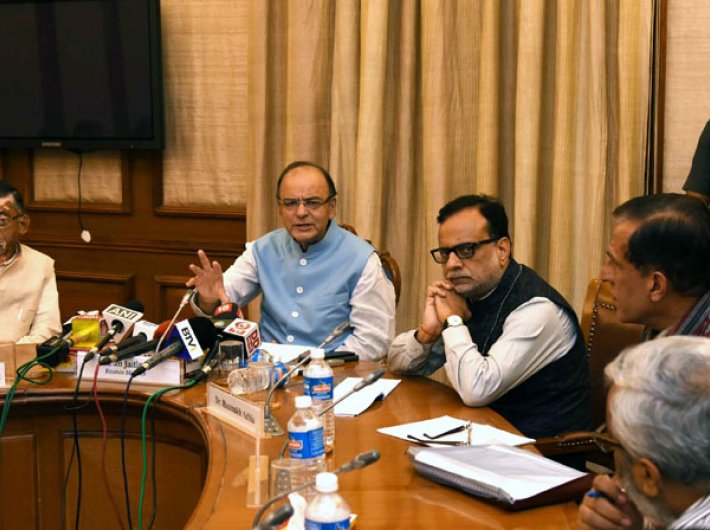Excerpts from Arun Jaitley's speech at the 'Digital Payments: Inclusion, Growth, Opportunity' conference on Saturday
We had two parallel exercises in the government for the last 30-40 years. Every time we had a discussion on economic policy or budget there always was discussion on rationalisation of subsidies. And as part of the poverty alleviation programmes… and at time as part of pre-election announcement the quantum [of subsidies] gets increased… and the quantum had its own large share in the budget.
Now these unstructured subsidies, which were not only targeted for weaker sections, over years while we kept having academic discussions on rationalising subsidy… in effect, these became unquantified amounts across the country which were being given to unidentified sections. In this process of implementation there were subsidies of which wealthier sections of society got a larger benefit. So when you subsidised petrol for example, those owning vehicles got larger benefit.
Another example, unconnected to this: during the last UPA government, the whole idea of UID was created. Obviously in a democracy like ours views were expressed from all sides; the idea was not matured enough. So that’s how it was set up as an executive measure.
The idea was to have every Indian to have a UID. There were apprehensions in public discourse. Some saw a move to immigrants getting advantage... some thought it as an encroachment as far as personal liberties are concerned. It did not have legal backing; so the government at that time decided to have statutory backing.
So they went for legislation. The whole idea of law was that 'there shall be UID, this is process, this is how you acquire it'. But what will you do with it?[But] the legislation was silent [on the purpose], then we got into a side debate for provisions related to encroachment of privacy, and the supreme court case, and I think these two parallel debates – one related to rationalisaiton of subsidy and other having a UID and advantage of this – it started converging. And the convergence was that you must have a UID, you must introduce several safeguards as far as encroachment on liberties are concerned, make them tighter so that sharing doesn’t happen, and link it to purpose it is used for – as the purpose is that if you want an advantage of public revenue in any manner, then the government, central or state, will be entitled to insist that UID be produced.
Then as a result of the parliamentary process, the pith and substance of the legislation that we did pass finally was: anyone who wanted any government support must produce UID. And that’s how it became incidental to the main objective of the Act. I think the whole idea seems to have worked initially quite well. We now have various identities of [beneficiaries, under] which constitute the JAM [Jandhan-Aadhaar-Mobile]. The JDY by any standard is an exemplary programme where in 240 million people were enrolled for bank accounts in a matter of weeks if not days and you had banking official and business correspondents going home to home to open accounts. Mobile telephony has picked up in India and has crossed one billion mark; that’s another identity. We have Aadhaar covering 950 million people. In fact the inadequacy if any is related to minors. As far as adults are concerned, are you moving towards the final figure?
And therefore the legislation also has an element of flexibility that till such time as some people don’t have Aadhaar they can produce an alternative ID.
Therefore I think the whole idea of a) targeting, b) exclusion, c) elimination of corruption and d) directly reaching the bank account at a great pace; all these elements were present… and this will not only will help us in subsidy but it will also expand.
UID in GST
Yesterday I had a meeting with the GST council and the issue that was discussed was that there are 11 hilly states (Himachal Pradesh, Uttarakhand, Jammu and Kashmir, and the eight in the northeast) where there are tax exemptions. After GST comes into existence, how do geographical exemptions and all India network co-exist? So in Punjab and Haryana you have to pay tax but in Uttarakhand and Himachal you are exempted. And they are part of the same system. There are industry/product-based exemptions – some are phased out, but some remain. So how will it work?
Learning from the DBT system the immediate unanimous decision was that everyone will have to pay tax including the exempted entities and they will get reimbursement through a DBT kind of mechanism. It is an easy solution. The entire transaction can be done quickly. The time period of two weeks for reimbursement can be decided.
Everywhere we implemented DBT – whether it is pensions, LPG subsidy, duplicity, fake identities, non-existent people getting in – our experience has been that the entire gamut of corruption has been eliminated, like in LPG. If you want to eliminate the top tier consumers from subsidy and target the poor, you can do it. You can plug leakages, fix corruption. It means you will be reaching out targeted beneficiaries more effectively. We are in the initial stages in various areas of implementation and the apprehension have been largely addressed… so if any of these challenges come up I think the system will be reasonable enough to take care of them.
Now direct payments through this whole process of identification is slowly going to become a rule and not resorting to it will become an exception.
